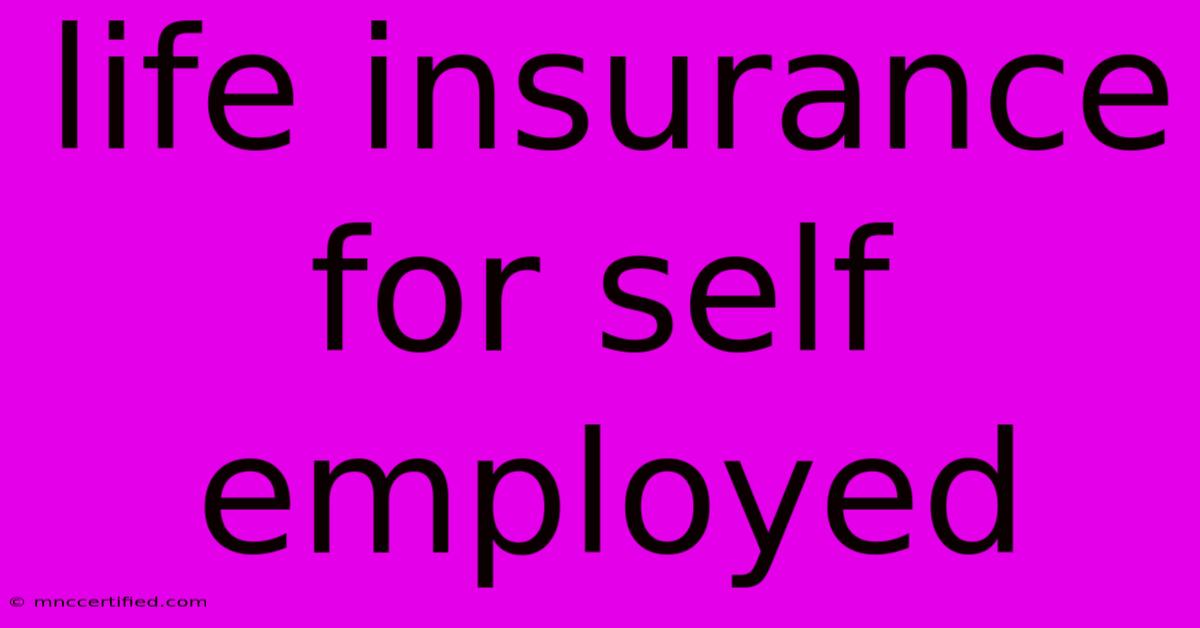Life Insurance For Self Employed

Table of Contents
Life Insurance for the Self-Employed: Protecting Your Business and Family
Being self-employed offers freedom and flexibility, but it also comes with unique challenges, especially when it comes to financial security. One crucial aspect often overlooked is life insurance. While employees often receive group life insurance benefits through their employers, the self-employed must actively secure their own coverage. This article will delve into the importance of life insurance for the self-employed, exploring different types of policies and offering guidance on choosing the right plan.
Why Life Insurance is Crucial for the Self-Employed
Unlike traditional employees, self-employed individuals bear the sole responsibility for their financial well-being and that of their dependents. Life insurance acts as a safety net, offering crucial protection in several ways:
-
Protecting your family: In the event of your untimely death, life insurance provides a financial safety net for your family, covering expenses like mortgage payments, children's education, and everyday living costs. This prevents financial hardship and ensures their continued stability.
-
Business continuity: For many self-employed individuals, their business is their livelihood. Life insurance can provide funds to cover business debts, maintain operations, or facilitate a smooth transition to a successor, preventing the loss of a valuable asset. This is especially crucial for sole proprietorships or partnerships.
-
Estate planning: Life insurance proceeds can be used to cover estate taxes, ensuring a smoother transfer of assets to your heirs and minimizing potential financial burdens on your family.
-
Debt protection: Life insurance can help pay off outstanding debts, such as business loans or mortgages, preventing your family from inheriting these financial obligations.
Types of Life Insurance for the Self-Employed
Several life insurance options cater to the specific needs of the self-employed:
1. Term Life Insurance:
- What it is: Provides coverage for a specific period (term), offering a death benefit if you die within that term. It's generally the most affordable option.
- Pros: Cost-effective, simple to understand, ideal for short-term needs or those on a tight budget.
- Cons: Coverage ends at the end of the term; premiums may increase significantly upon renewal. This is a good option if you have a specific time frame in mind, for example, until your children are finished with college.
2. Whole Life Insurance:
- What it is: Offers lifelong coverage and builds cash value that grows tax-deferred.
- Pros: Provides permanent coverage, offers cash value that can be borrowed against or withdrawn, and can be a valuable long-term investment.
- Cons: More expensive than term life insurance, cash value growth is not guaranteed. This is a good option if you want long-term security and the potential for cash value growth.
3. Universal Life Insurance:
- What it is: A type of permanent life insurance offering flexible premiums and death benefits.
- Pros: Flexibility in premium payments, potential for higher cash value growth than whole life, allows for adjustments based on changing needs.
- Cons: More complex than term life insurance, premiums can fluctuate, and there are potential risks associated with the cash value component. This is an option if you anticipate needing flexibility in your premium payments.
4. Business Overhead Insurance:
- What it is: Specifically designed to cover business expenses in the event of the owner's disability or death.
- Pros: Helps maintain business operations during a time of crisis.
- Cons: Does not provide a direct benefit to the owner's family.
Choosing the Right Life Insurance Policy
Selecting the appropriate life insurance policy requires careful consideration of several factors:
- Your budget: Determine how much you can afford to pay in premiums.
- Your needs: Assess your family's financial needs and the value of your business.
- Your age and health: Your age and health status influence your eligibility and premium rates.
- Your risk tolerance: Consider the level of risk you are willing to accept.
- Professional advice: Consulting with a qualified financial advisor or insurance broker is highly recommended. They can help you navigate the complexities of life insurance and select a plan that aligns with your specific circumstances.
Off-Page SEO Considerations
To boost the organic reach of this article, consider:
- Guest blogging: Contribute articles on related topics (financial planning for the self-employed, small business insurance) to other relevant websites.
- Social media marketing: Share the article across relevant social media platforms, engaging with users and participating in discussions.
- Backlinks: Encourage other websites and blogs to link back to this article.
- Online community participation: Engage in relevant online forums and communities, providing valuable insights and subtly promoting your article.
By carefully considering your individual needs and seeking professional guidance, you can secure the appropriate life insurance coverage to protect your family and your business, providing peace of mind in your self-employed journey. Remember, proactive planning is key to securing your financial future.

Thank you for visiting our website wich cover about Life Insurance For Self Employed. We hope the information provided has been useful to you. Feel free to contact us if you have any questions or need further assistance. See you next time and dont miss to bookmark.
Featured Posts
-
38 47 An Hour Is How Much A Year
Nov 21, 2024
-
21 35 An Hour Is How Much A Year
Nov 21, 2024
-
Richard Geres Today Show Controversy
Nov 21, 2024
-
26 52 An Hour Is How Much A Year
Nov 21, 2024
-
Insurance Agents Des Moines Iowa
Nov 21, 2024